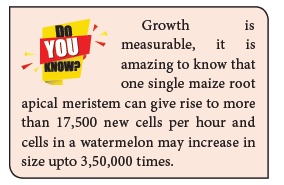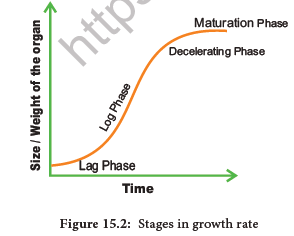Learning Objectives:-
The learner will be able to,
• Define growth.
• List out and differentiate the phases of growth.
• Understand the ways of measuring growth.
• Explain the structure, precursor, bioassay and physiological effects of plant growth regulators.
Plant Growth and Development Learning Objectives Bamboos are evergreen grasses and certain species of it can grow at the rate of growth 91 cm per day. The Saguaro
Cactus is a tree like cactus and is a slow growing plant. The rate of growth is one inch in the first ten years and it does not begin to flower until it is about 60 years old. It’s lifespan exceeds 150 years and takes 75–100 years to grow a side arm.
Chapter Outline
15.1 Characteristics of growth
15.2 Plant growth regulators
15.3 Plant movements
15.4 Photoperiodism
15.5 Vernalization
15.6 Seed germination and dormancy
15.7 Senescence
15.8 Stress physiology
The Banyan tree continues to grow for thousands of years and some others particularly annual plants cease growth within a season or within a year. Can you understand the reasons? How does a zygote give rise to an embryo and an embryo to a seedling? How does a new plant structure arise from the pre-existing structure? Growth is defined as an irreversible permanent increase in size, shape, number,volume and dry weight. Plant growth occurs by cell division, cell enlargement, differentiation and maturation.
15.1 Characteristics of Growth
• Growth increases in protoplasm at cellular level.
• Stem and roots are indeterminate in growth due to continuous cell division and is called open form of growth.

• The primary growth of the plant is due to the activity of apical meristem where, new cells are added to root and shoot apex causing linear growth of plant body.
• The secondary vascular cambium and cork cambium add new cells to cause increase in girth.
• Leaves, flowers and fruits are limited in growth or of determinate or closed form growth.
• Monocarpic annual plants produce flowers only once during lifetime and dies. Example: Paddy and Bean
• Monocarpic perennials produce flowers only once during life time but the plants survive for many years.
Example: Bamboo.
• Polycarpic perennials produce flowers every year during life time. Example: Coconut.
15.1.1 Indication of growth
Growth in plants can be measured in terms of,
i. Increase in length or girth (roots and stems)
ii. Increase in fresh or dry weight
iii. Increase in area or volume (fruits and leaves)
iv. Increase in number of cells produced.
15.1.2 Phases of growth
There are three phases of growth,
1. Formative phase
2. Elongation phase
3. Maturation phase
1. Formative phase: Growth in this phase occurs in meristematic cells of shoot and root tips. These cells are small in size, have dense protoplasm, large nucleus and small vacuoles. Cells divide continuously by mitotic cell division. Some cells retain capability of cell division while other cells enter the next phase of growth (Figure 15.1).
2. Elongation Phase: Newly formed daughter cells are pushed out of the meristematic zone and increases the volume.It requires auxin and food supply, deposition of new cell wall materials (intussusception), addition of protoplasm and development of central vacuole take place.
3. Maturation Phase: During this stage cells attain mature form and size.Thickening and differentiation takes place. After differentiation, the cells do not grow further.

It is an analysis of the motion of cells or expansion.
1. Stages in Growth rate
The total period from initial to the final stage of growth is called the grand period of growth. The total growth is plotted against time and ‘S’ shaped sigmoid curve (Grand period curve) is obtained.It consists of four phases (Figure 15.2).
They are:
i. Lag phase
ii. Log phase
iii. Decelerating phase
iv. Maturation phase
i. Lag phase
In this phase new cells are formed from pre-existing cells slowly. It is found in the

tip of the stem, root and branches. It is the initial stage of growth. In other words,growth starts from this period (Figure 15.2).
ii. Log phase or exponential growth Here, the newly formed cell increases in size rapidly by deposition of cell wall material. Growth rate is maximum and reaches top because of cell division and
physiological processes are quite fast.The volume of protoplasm also increases.It results in rapid growth and causes elongation of internode in the stem.
iii. Decelerating phase or Decline phase or slow growth phase
The rate of growth decreases and becomes limited owing to internal and external or both the factors because the metabolic process becomes slow.
iv. Steady state period or maturation phase
In this phase cell wall thickening due to new particle deposition on the inner surface of the cell wall takes place. The overall growth ceases and becomes constant. The growth rate becomes zero.
2. Types of growth rate
The increased growth per unit time is termed as growth rate. An organism or part of an organism can produce more cells through arithmetic growth or geometric growth or both.
i. Arithmetic Growth Rate
If the length of a plant organ is plotted against time, it shows a linear curve and this growth is called arithmetic growth.
• The rate of growth is constant and it increases in an arithmetic manner.
• Only one cell is allowed to divide between the two-resulting progeny cell.
• One continues to divide but the other undergoes cell cycle arrest and begins to develop, differentiate and mature.
• After each round of cell division, only a single cell remains capable of division and one new body cell forms.
For example, starting with a single cell after round 1 of cell division there is one dividing cell and one body cell. After round
2 there are two body cells, after round 3 there are three and so on (Figure 15.3).
The plants single dividing cell would undergo one million rounds of nuclear and cellular division. If each round requires one day, this type of arithmetic increase would require one million days or 2739.7 years.This arithmetic rate is capable of producing small number of cells present in very small parts of plants. For example the hair on many leaves and stems consists of just a single row of cells produced by the division of the basal cell, the cell at the bottom of the
hair next to other epidermal cells. Hair may contain 5 to 10 cells by the division of the basal cell. So, all its cells could be produced in just five to ten days. In the figure 15.4, on plotting the hight of the plant against time a linear curve is obtained. Mathematically it is expressed as:
Lt = Lo + rt
Lt = length at time ‘t’
Lo = length at time zero
r = growth rate of elongation per unit

